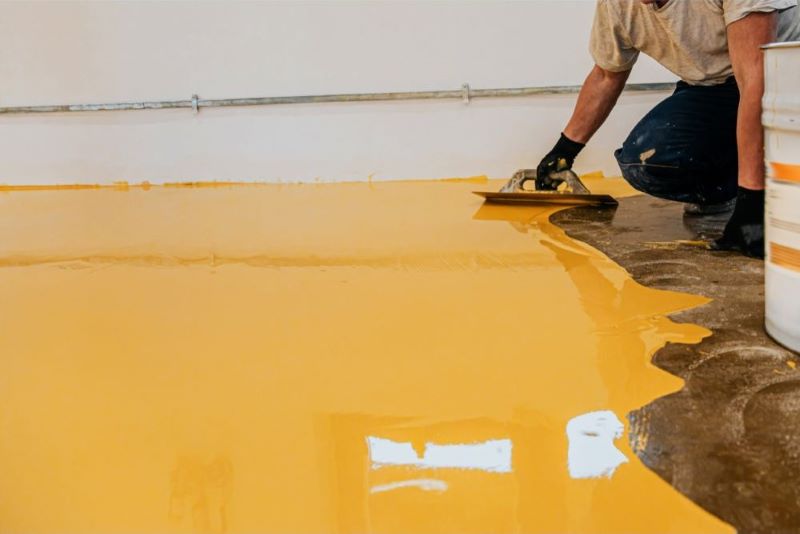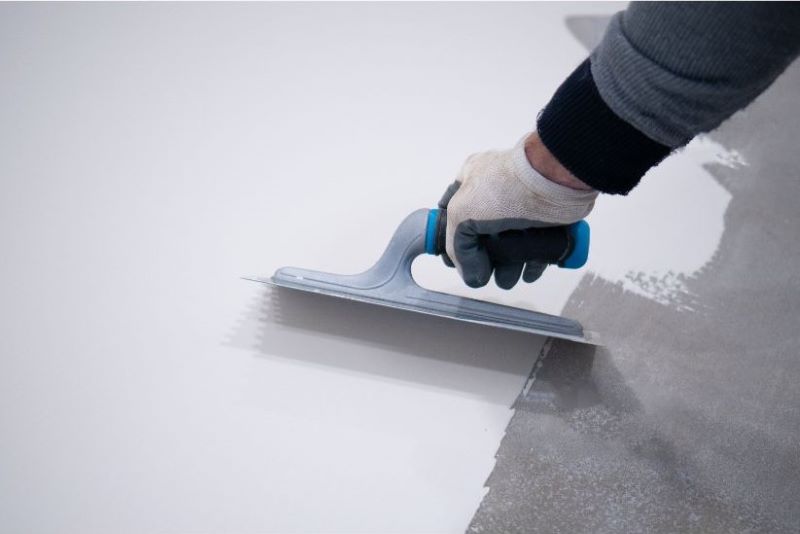Concrete floor painting and/or sealing can add years to the life of your flooring while offering many kinds of aesthetic benefits and protection. Although several factors affect how long your particular coating lasts, in some circumstances, your coatings can last for several decades before requiring substantial repair or replacement. A often asked question is “How Long Do Concrete Coatings Last in Perth? Even if it’s tough to be certain for sure, let’s discuss the factors that contributed to this view.
Question: How Long Do Concrete Coatings Last?

The lifespan of various kinds of concrete coatings will fall into a somewhat defined time frame:
Acrylic Concrete Coatings
Acrylic sealers don’t need to be recoated for 1-3 years.
Epoxy Coatings
Epoxy coatings require recoating every 5-10 years.
Silicate Concrete Coatings
Concrete coatings that are silicate-based never deteriorate. A calcium silicate hydrate structure is formed within the pores of the concrete by initiating a chemical reaction. Once built, that structure can only be taken down by taking out the concrete itself.
Silane Siloxane Water Repellent Coatings
Water-repellent coatings made of silane-silicone can last anywhere from 6 months to 10 years. Higher solids solutions with non-recycled resins can last up to 7–10 years, however low solids solutions with recycled resins can only last 6 months to a year.
Water-Repellent Silicone Coatings
The lifespan of silicone coatings can range from 6 months to 7 years. Higher solids solutions can last up to 5-7 years, but the majority of low solids solutions purchased in stores will only last 6 months to a year.
Urethane Coatings
Urethane coatings require a recoat every 5-10 years.
The concrete sealer or coating real lifespan is determined by several factors. Suitability, coverage rate, and performance capabilities can all be ascertained by applying the product to a test area.
The following are some of the factors that affect how long do concrete coatings last:
Amount of Coatings
Most coatings should be applied in two coats unless the product indicates otherwise. There is hardly much surface protection left after the first coat since it tends to seep into the substrate. Better surface protection is made possible by the second coat’s ability to stick to the first.
Amount of Traffic
The amount of traffic your concrete coating experiences also affects how long it will last. A concrete coating that gets heavy use will not endure as long as one that receives little to no use.
Applying the Product

Coatings should be applied using a roller and penetrating sealers with a sprayer. Using a roller to apply a penetrating sealer increases the risk of applying too much or too little coating while using a sprayer to apply a coating increases the risk of applying insufficient product.
Appropriate Coatings
Selecting the appropriate coating is among the most important factors in achieving the longest possible lifespan. It is likely to fail if you put an epoxy or urethane coating on outdoor brick. Stone will likely create white crystals on the surface if a silicate coating is applied. Sealers and coatings have specific applications, and using them for purposes other than those advised can lead to failure.
Condition of the Substrate
The expected life of the coating may be shortened if there are problems with the substrate. Deterioration, old sealer, wetness, and moisture, for instance, can all shorten a coating’s lifespan. Dense substrates require less material than porous substrates. To have the right amount of material, you must be adaptable enough to adjust to the substrate.
Environment
There can be moisture on the concrete if a coating is applied first thing in the morning. Applying a coating in the middle of the day may cause problems with curing because the concrete will be hot. Late afternoon or early evening is the ideal time to coat concrete outside.
Preparing the Surface
Preparing the surface is important. The concrete surface needs to be adequately prepared, dry, and clean. Concrete needs to be ground if a coating calls for it to be. There shouldn’t be any coating on if you are using a penetrating sealer.
Quality of the Product
The quality of one product varies greatly from another. The percentage of solids, the raw material source, and the procedure itself will all significantly affect a product’s performance and lifespan.
UV and Chemical Exposure
Chemicals and sunlight (UV) are frequently exposed to a great extent when coatings are put in residential buildings. If epoxy coatings are constantly exposed to this combination, it can be dangerous.
Question: How to Choose the Right Concrete Coatings?

There are several factors to consider while choosing the best coating for your concrete surface, such as:
- Application of Future Coat (for instance, line marking)
- Gloss Level
- Top Coat Quality
- UV Stability
When self-levelling/self-smoothing epoxies have been used, or when a higher level of scratch resistance is required, polyurethane is an excellent choice for a topcoat. As topcoats, polyurea and polyaspartic are also excellent choices. Non-slip grains can be added to provide a slip rating.
For assistance in selecting the best choice for you, see a concrete coating professional in Perth.
Summary
There are lots of factors that affect how long a coating lasts, but like any other product you use, high-quality application yields the best results. The question beforehand – How long do concrete coatings last? It all depends on the type of coating you choose, how you use your concrete, how thoroughly they are prepared and applied, and, of course, how well you take care of them. Your concrete coating should ideally last for several decades. Although long-lasting concrete cannot be guaranteed, you may ask Perth’s concrete coating professionals to apply the best and most appropriate concrete coatings for you.
